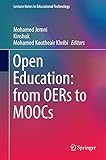Open Education: from OERs to MOOCs [electronic resource] / edited by Mohamed Jemni, Kinshuk, Mohamed Koutheair Khribi.
Material type: TextSeries: Lecture Notes in Educational TechnologyPublisher: Berlin, Heidelberg : Springer Berlin Heidelberg : Imprint: Springer, 2017Description: X, 359 p. 62 illus. online resourceContent type: text Media type: computer Carrier type: online resourceISBN: 9783662529256Subject(s): Education | Education -- Data processing | Educational technology | Lifelong learning | Adult education | Education | Educational Technology | Lifelong Learning/Adult Education | Computers and EducationAdditional physical formats: Printed edition:: No titleDDC classification: 371.33 LOC classification: LC8-6691Online resources: e-book Full-text access
TextSeries: Lecture Notes in Educational TechnologyPublisher: Berlin, Heidelberg : Springer Berlin Heidelberg : Imprint: Springer, 2017Description: X, 359 p. 62 illus. online resourceContent type: text Media type: computer Carrier type: online resourceISBN: 9783662529256Subject(s): Education | Education -- Data processing | Educational technology | Lifelong learning | Adult education | Education | Educational Technology | Lifelong Learning/Adult Education | Computers and EducationAdditional physical formats: Printed edition:: No titleDDC classification: 371.33 LOC classification: LC8-6691Online resources: e-book Full-text access | Item type | Current library | Collection | Call number | Copy number | Status | Notes | Date due | Barcode |
|---|---|---|---|---|---|---|---|---|
| E-Books | MEF eKitap Kütüphanesi | Springer Nature | LC8 -6691 (Browse shelf (Opens below)) | Available | NATURE | 1419889-1001 |
Open Education, MOOCs, and opportunities -- Survey and reflection of open education policies -- Shaping the Future of Education -- Technology-Supported Large-Scale Transformative Innovations for the 21st Century School Education -- Impact of Openness on Institutions -- Promoting Arabic Open Educational resources in Arab Countries -- Creative Commons Education program -- Experiences of running a MOOC - A case in Taiwan -- Review of existing MOOC platforms -- Arabic Massive Open Online Courses -- Rwaq: Arab platform for MOOCs -- Open classrooms and schools through cloud computing.
This book focuses on the emerging phenomenon of Massive Open Online Courses (MOOCs), which are changing the fundamental underpinning of educational systems worldwide and forcing educators and other stakeholders to re-think the way instruction is currently conducted. It examines the origins of MOOCs within the context of the open education movement, and reviews current policies, guidelines and initiatives to promote the use of ICT in education through the development and use of open educational resources from international practices, including implementation and licensing issues. With a particular focus on new trends in MOOCs, the book explores the potential of this emerging paradigm, its rise and its impact on openness in education. Various new initiatives are also presented, including more global examples and those that are more geared to certain regional contexts. The book is intended as a stepping stone for both researchers and practitioners who are looking to approach MOOCs from a holistic perspective.
5
